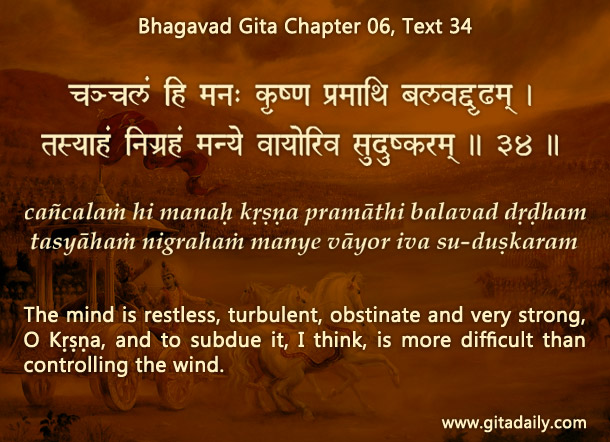Suppose we are the main caregiver for a dear relative suffering from Alzheimer’s. When they become non-communicative or even violent, we will be concerned, but we will continue doing whatever is necessary to care for them. And whenever they are lucid, we will treasure those moments of connection and reciprocation.
Our mind is like an Alzheimer’s patient — it often loses connection with reality because of being infected by impurities. Our impure mind can act in ways that range from restless like a child to violent like a madman (Bhagavad-gita 06.34). Thankfully, whereas Alzheimer’s is rarely curable, our mind is eminently curable by potent spiritual practices. There’s a caveat, though: whereas we can outsource the care of an Alzheimer’s patient, we can’t do the same for our mind; we always remain its primary caregiver.
During our daily life, our mind may go through disruptive or even destructive phases. For example, it may be maddened by worldly desires, whereby it rebels against the ethical and spiritual standards we hold sacred. During such phases, we need to keep doing what we can about the things important for us while patiently waiting for the mind to calm down.
If we dwell only on these difficult times, however, we will soon become resentful about being stuck with such a mind. That’s why it’s vital that we treasure the times when our mind is calm and cooperative, when we can go about our life’s business peacefully. And we need to especially cherish those times when our mind is receptive to the truths of life taught in wisdom-texts such as the Gita. Both these are moments that illustrate our mind is healing.
By dwelling on such moments, we can persevere in treating our mind.
One-sentence summary:
Treat our mind like an Alzheimer’s patient — be not resentful when it is disruptive or destructive; be grateful when it is cooperative or receptive.
Think it over:
- How is our mind like an Alzheimer’s patient?
- In what ways does our situation differ from that of an Alzheimer’s caregiver?
- Note three times when your mind was cooperative or receptive.
***
06.34: The mind is restless, turbulent, obstinate and very strong, O Krishna, and to subdue it, I think, is more difficult than controlling the wind.
To know more about this verse, please click on the image
Explanation of article:
Podcast:


Hare Krishna. Dandwat. Thanks for the article. This is a very in-depth and insightful analysis of the workings of mind.
Thank you, happy to be of service.
Harekrishna prabhu millions of dandavats prabhu you r a wonderful personality although for the same 700 shlokas u explain different meanings we will be indebted throughout our life to u and our srilaprabhupad harekrishna we r all mentally handicapped please pray for us prabhu HARIHARIBOL
Thank you, happy to be of service.